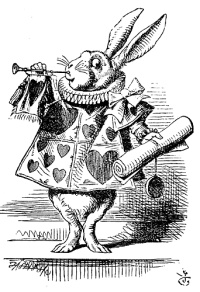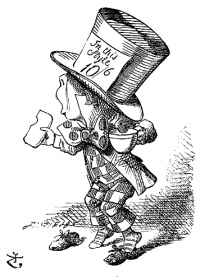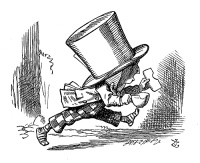Who Stole the Tarts?
Studies in Alice XI, by Marc Edmund Jones This lesson considers the eleventh chapter of Alice in
Wonderland and the eleventh great principle of wisdom
in the Philosophy of Concepts as revealed through the
adventure of Alice is that life is a combination of
factors or that nothing of permanence or worth in life is
outwardly or objectively simple. This is the principle
brought out in the initial lesson of the preliminary
Plotinus series, that spirituality is composite and this is
a fundamental realization in any effective approach
toward a mastery of life. Spiritual things are simple in
their own nature and in their component parts all
material things are likewise simple. But an
aggregation of tangible details is required for any
superphysical manifestation as was well understood by
Jesus when speaking for the group spirit or oversoul.
He said "where two or three are gathered in my name,
there am I in the midst of them," and the student of
eternal philosophy must learn that more than one
individual is needed in any sort of manifestation on the
mundane sphere. Thus both parents are needed for the first entry into visible existence. One
parent cannot bring him forth. Habits and all organic functioning are built on natural instinct on
the one hand and racial, national or family custom on the other. Emotions obviously require a
social state, and all idea and processes of thinking are likewise dependent on individuals other
than self in order to give them picturization or reality to self. Fate is an awkward term and leads
to much misunderstanding because it places the emphasis outside the individual. As a matter of
fact, fate is no more than the climax in the drama of life or the crowding of events that forces
realization. Circumstances by their very nature muster all tendencies toward these critical points
and issues of life or recombine facts that intensify existence.
This lesson considers the eleventh chapter of Alice in
Wonderland and the eleventh great principle of wisdom
in the Philosophy of Concepts as revealed through the
adventure of Alice is that life is a combination of
factors or that nothing of permanence or worth in life is
outwardly or objectively simple. This is the principle
brought out in the initial lesson of the preliminary
Plotinus series, that spirituality is composite and this is
a fundamental realization in any effective approach
toward a mastery of life. Spiritual things are simple in
their own nature and in their component parts all
material things are likewise simple. But an
aggregation of tangible details is required for any
superphysical manifestation as was well understood by
Jesus when speaking for the group spirit or oversoul.
He said "where two or three are gathered in my name,
there am I in the midst of them," and the student of
eternal philosophy must learn that more than one
individual is needed in any sort of manifestation on the
mundane sphere. Thus both parents are needed for the first entry into visible existence. One
parent cannot bring him forth. Habits and all organic functioning are built on natural instinct on
the one hand and racial, national or family custom on the other. Emotions obviously require a
social state, and all idea and processes of thinking are likewise dependent on individuals other
than self in order to give them picturization or reality to self. Fate is an awkward term and leads
to much misunderstanding because it places the emphasis outside the individual. As a matter of
fact, fate is no more than the climax in the drama of life or the crowding of events that forces
realization. Circumstances by their very nature muster all tendencies toward these critical points
and issues of life or recombine facts that intensify existence.
Here is the principle of society or the cooperative place of each person in the scheme of life
complications of every other with whom he manifests relations. Man by himself is simple but in
root is-ness he is utterly unmanifest. As he gains reality and conscious being in his own
comprehension and contemplation of self he becomes in effect a group spirit. Mastery
constitutes him a group spirit in fact and this is a phenomenon to be noted in all outstanding
leadership. In general man is cooperatively complicated with his fellows in circumstances that
in some details lend drama to his own being but through which in most details he is but
supernumerary in the various dramatic situations of those about him. The symbolism of the
eleventh chapter of Alice is interesting in showing the gathering into one ensemble of practically
all characters of the book introduced up to this point. There is here in the trial the climax of the
Wonderland narrative, and like all good dramatic climax it brings the whole company out on the
stage. The white rabbit is as important here as in earlier sections of the story. Bill, the lizard,
 here manifests his usual association with misfortune.
The mad hatter is no less true than usual to his
symbolism of the still inchoate mental nature. For
these last two Wonderland lessons there is the perfect
dramatic climax that well serves to illustrate the
fundamental nature of the social constitution in all trial
or serious issues of life. And then for good measure
there are two other points in the symbolism that drive
this detail home. In the first place the tarts, the theft
of which has brought about the gathering here of the
characters, are made of everything. They show this
same aggregation of factors inanimately. The cook
states that they are made of pepper and the dormouse
says they are made of treacle. Each person is able to
see his own constituent finger as it were in the pie of
life. And then Alice is here seen to begin to grow, but
this time to do so naturally without eating or drinking
anything. She has become the group spirit in fact and
her expansion is apart from her own volition.
here manifests his usual association with misfortune.
The mad hatter is no less true than usual to his
symbolism of the still inchoate mental nature. For
these last two Wonderland lessons there is the perfect
dramatic climax that well serves to illustrate the
fundamental nature of the social constitution in all trial
or serious issues of life. And then for good measure
there are two other points in the symbolism that drive
this detail home. In the first place the tarts, the theft
of which has brought about the gathering here of the
characters, are made of everything. They show this
same aggregation of factors inanimately. The cook
states that they are made of pepper and the dormouse
says they are made of treacle. Each person is able to
see his own constituent finger as it were in the pie of
life. And then Alice is here seen to begin to grow, but
this time to do so naturally without eating or drinking
anything. She has become the group spirit in fact and
her expansion is apart from her own volition.
The achievement of imagination in the chapter, or the eleventh great scientific anticipation, is the revelation of the principles in the mechanization of consciousness which is the outstanding miracle of modern life. The process largely unrealized by the layman, and as yet barely scratching the surface of its possibilities, was given real impulse most graphically with the development of the talking machine by Thomas A. Edison. The telephone before this, and the telegraph even earlier, were striking examples of the mechanical transmission of intelligence. Indeed, the establishment of written language might be called the mechanization of consciousness, but in this consideration the term is restricted to the use of intelligent mechanical devices. Following the recording in durable form of sound came the invention and perfection of the motion picture, and on the heels of this the radio in its surprising popularization of the home receiving set. These are the popular developments. Innumerable scientific devices with some that are remarkable beyond description have made possible the tremendous contemporary advances in all departments of human knowledge. The significance of all this is not the ingenuity of the human mind but the demonstration of the fact that what nature does as divinely inspired, intelligent man is able increasingly to do with pure machinery.
The symbolism of the trial brings out this resolving of unconscious or subjective order and law to
conscious and determined outer establishment. Three of the details serve admirably to illustrate
in anticipatory form the modern mechanization of consciousness. First are the slates and the
forgetting of their names by jurors. The whole basis of consciousness is objectification and as
psychology and perhaps psychoanalysis in particular has learned in the unraveling of subjective
kinks, every detail of consciousness must be taken out and aired occasionally like dress clothes.
Man's mechanical devices give him an efficient slate to use as he sits in the jury box of life. He
can turn on a radio, put on a record, go to a motion picture and in dozens of different ways find
an easy and convenient objectification for any mood or manifestation of consciousness desired.
Second is the squeaking of the pencil and its abstraction from the hand of poor Bill by Alice.
Man need not accept the friction or squeaking of life. He can use intelligence or his finger to
accomplish his ends. Third is the resolving of dates in the calendar to shillings and pence or the
blind intelligence in all operation which, noted in consciousness and obvious in stupidity as here
but equally present in cleverness, is the
fundamental basis of machinery.
The law of applied psychology or the eleventh big idea for the solution of personal problems is brought out here in the technique of denial. In its abstract or real form this denial is the nonacceptance of the unknown, and while on occasion it may seem tremendously bigoted it is the true foundation of science. In the case of the March hare the denial was refusal to be appropriated offhand, and he revealed therefore the genius of modern New Thought which is the acceptance as fact of the nonnecessity of participation in circumstances against the will or desire. The hare denies on general principles without waiting to hear what it is he denies and the king promptly rules the matter stricken off the record. Whatever man refuses to accept cannot be pinned on him by life or circumstances. The student must learn to REFUSE ENTANGLEMENT. He must for the sake of consciousness and reality get into the complications of life but he can, if he will, control everything into which he enters.

Sabian.org





